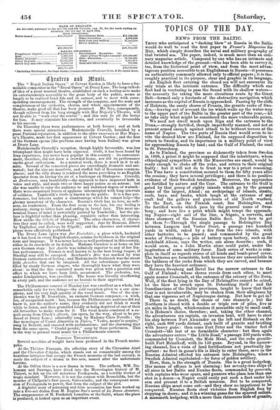t4tatrts sub 311usir.
The " Royal Italian Opera" at Covent Garden is likely to have a for- midable competitor in the "Royal Opera" at Drury Lane. The long-talked- of idea of a great musical theatre, established on such a footing as to make its entertainments accessible to the great body of the public, seems at length to be realized bona fide and in earnest, and to meet with corm- mending encouragement. The strength of the company, and the scale and completeness of the orchestra, chorus, and whole appointments of the theatre, make good all that has been promised. Mr. Gye, consequently, though relieved from his long struggle with Her Majesty's Theatre, will not be able to " walk over the course" ; and this may be all the better for him. It may stimulate his exertions, and eventually be favourable to his success.
On Thursday there were performances at both houses; and at both there were special attractions. Mademoiselle Cruvelli, heralded by a great Parisian reputation, in addition to the older successes at Her Majes- ty's Theatre, made her first appearance at Covent Garden ; and the first of the German operas (the previous ones having been Italian) was given at Drury Lane.
Mademoiselle Cruvelli's reception, though highly favourable, was less triumphant than might have been expected. Otello, it has been found by Icing experience, has never been popular in this country : its announce- ment, therefore, did not draw a crowded house, nor did its performance excite great enthusiasm. As a musical work, there is much in it to ad- mire. Several of the concerted pieces are exceedingly dramatic and ani- mated ; but the airs are manieres, and stuffed full of Rossinian common- places; and the silly drama is rendered the more provoking to an English spectator from its having the air of a burlesque on Shakspere. Cruvelli, as Deedemona, sang beautifully—she appeared to have improved both in voice and style, and made two or three happy points as an actress; but she was unable to raise the audience to any sustained degree of warmth: there were occasional bursts of applause intermingled with long intervals of coldness. Tamberlik's Otello is known to the public. It is a fine per- formance, but labours under a disadvantage which he cannot help—the gloomy monotony of the character. Rossini's Otello has no love, no soft- ness, no tenderness. From the first scene to the last, his one feeling is jealousy, rising to bitter hate and ending in brutal fury. This most un- musical frame of mind is powerfully painted by Tamberlik ; but the pic- ture is frightful rather than pleasing, repulsive rather than Interesting. How unlike the Othello of Shakspere ! The other characters, if charac- ters they may be called, were well supported; Digo by Ronconi, Elmiro by Tagliafico, and Roderigo by Stigelfi ; and the choruses and concerted pieces were effectively performed. The Drury Lane opera was Der Freischiitz ; a piece which, hacknied as it has been in every English theatre, retains its freshness in the original form and language. It was never before so well performed in this country, either in its ensemble or its details. Madame Caradori is at home on her own German stage : her Agathe was infinitely superior to any of her Ita- lian performances. Formes is well known to be the best living Caspar, if Staudigl may still be excepted. Reichardt's Max was marked by true German earnestness of feeling; and Mademoiselle Sedlatzek was the nicest little Annehen that can be imagined. All the subordinate parts were filled by steady German singers, who thoroughly knew what they were about : so that the fine concerted music was given with a precision and effect to which we have been little accustomed. The orchestra, too, under Lindpaintner, was excellent. The house was literally overflowing in every part, and the audience set no bounds to their approval.


























 Previous page
Previous page